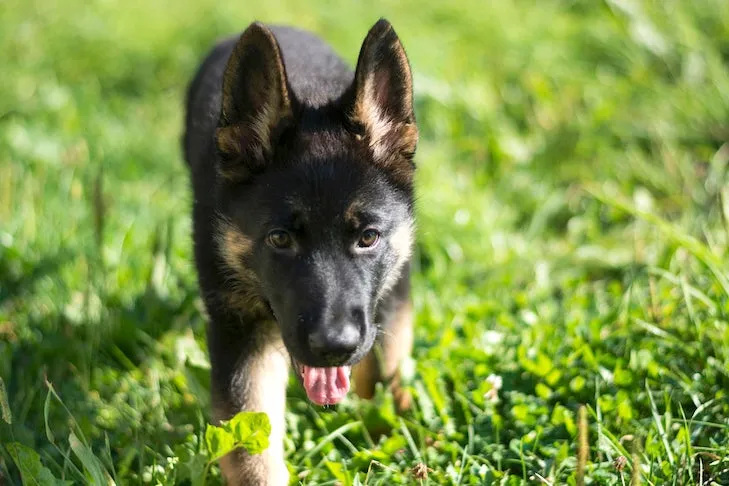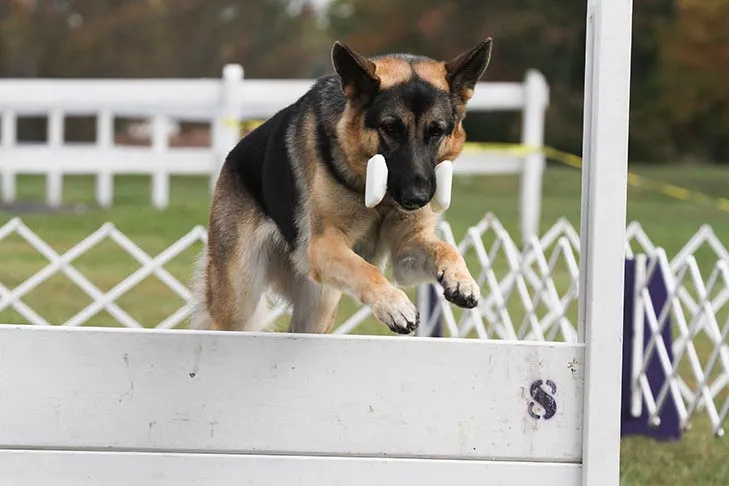The German Shepherd Dog (GSD) is an intelligent, versatile, and loyal breed, making them exceptional companions and working dogs. However, their intelligence and strong instincts mean that effective training from an early age is not just beneficial, but essential. For those seeking the Best Way To Train A German Shepherd, a consistent, positive, and comprehensive approach is key to unlocking their full potential and fostering a well-behaved, happy dog.
Early Foundations: Setting the Stage for Success
The journey to training a well-adjusted German Shepherd begins the moment you bring your puppy home. This breed thrives on mental stimulation and a clear understanding of their role within the family. Investing time and effort in their early development is crucial for shaping their behavior and strengthening your bond.
A well-bred German Shepherd Dog possesses a remarkable combination of intelligence, eagerness to please, and a strong work ethic. These innate qualities make them highly receptive to training. However, it’s important to remember that a bored German Shepherd can quickly become a destructive one. Consistent and engaging training, especially during the critical first year of life, is paramount.
When considering acquiring a GSD puppy, seeking out a reputable and ethical breeder is a significant first step. Experienced breeders understand their puppies’ individual temperaments and drives, enabling them to help you find the perfect match for your lifestyle and household. Alternatively, breed-specific rescue organizations are often a wonderful source for finding a GSD. Discussing your needs and expectations with rescue coordinators can help them guide you toward a puppy whose personality aligns with yours.

The Crucial Early Weeks: Socialization and Basic Manners (8 to 16 Weeks)
The period between 8 and 16 weeks is a critical window for puppy development, particularly for socialization. For German Shepherds, a breed naturally inclined towards guardianship, early exposure to a wide variety of people, places, and experiences is vital. This helps them develop confidence and distinguish between friendly strangers and potential threats, preventing fearfulness or aggression later in life.
Training Goal #1: Mastering Socialization
Proper socialization is the bedrock of a confident and well-behaved German Shepherd. Safely exposing your puppy to new sights, sounds, and smells in positive, non-threatening situations will build their self-assurance. Short, engaging games that involve your puppy and family members, introducing them to various household noises, and letting them explore different textures can significantly contribute to their developing confidence. This proactive approach ensures your GSD puppy grows into a dog that is comfortable and secure in diverse environments.
During this time, also introduce your GSD puppy to essential life routines, such as grooming. Regular grooming is necessary to manage their shedding and maintain coat and skin health. Gradually introduce them to combs, brushes, and nail clippers, making the experience as positive and stress-free as possible.
Training Goal #2: Embracing Crate Training
Crate training is an invaluable tool for German Shepherds, offering a safe and den-like space for your dog. It can help them become accustomed to alone time, reducing the risk of separation anxiety. Start by associating the crate with positive experiences, such as feeding times. Brief periods spent inside the crate during daily chores can also help your puppy feel more comfortable and secure.
Training Goal #3: Achieving Housetraining Success
German Shepherds are generally quick learners when it comes to housetraining. With consistent supervision and a predictable routine, most GSD puppies adapt readily. Crate training often complements housetraining efforts, as the dog’s natural instinct to keep their den clean helps prevent accidents.

Building on the Foundation: Obedience and Self-Control (3 to 9 Months)
As your German Shepherd puppy grows, the focus shifts towards building a solid obedience foundation and developing crucial impulse control. This breed’s innate drive to work and their intelligence mean they thrive on structured training and learning new commands.
Training Goal #1: Commencing Obedience Training
The legendary work ethic of the German Shepherd Dog can be channeled effectively through early and ongoing obedience training. Introducing basic commands such as “sit,” “down,” and “stay,” along with loose-leash walking, from an early age is essential. Enrolling in a puppy obedience class not only reinforces these commands but also provides valuable socialization opportunities. Consider introducing the principles of Canine Good Citizen (CGC) training during this stage.
Training Goal #2: Cultivating a Reliable Recall
Teaching your German Shepherd to come when called is a critical skill that requires consistent practice and patience. A reliable recall can be a lifesaver, ensuring your dog’s safety in various situations. Start by rewarding your puppy for responding to their name and gradually increase the distance and distractions as they progress.
Training Goal #3: Developing Impulse Control
Impulse control is vital for all puppies, and for a breed with the drive of a German Shepherd, it’s a key factor in preventing common behavioral issues like excessive barking, digging, destructive chewing, and chasing. The most effective way to foster impulse control is by teaching your dog to focus on you. This focus will have a profound positive impact on all your training efforts and can pave the way for success in various dog sports.
Incorporate opportunities for your puppy to practice impulse control by requiring them to sit before receiving their food, engaging in play, or going outside. As your German Shepherd advances in their obedience training, you can introduce more complex commands or tricks as prerequisites for rewards.
 German Shepherd Dog navigating an obedience course.
German Shepherd Dog navigating an obedience course.
Maturing and Refining Skills: From Adolescence to Adulthood (9 Months to 24 Months)
The journey of training a German Shepherd extends well into their adolescent and early adult years. While a dog may reach general adulthood around one year of age, German Shepherds often continue to mature physically and mentally until two or even three years old, with males typically maturing later than females.
Continuing the Training Journey
During this crucial period, it’s essential to reinforce impulse control and obedience skills. Advance your training by introducing more specialized activities that leverage the breed’s versatility, such as tracking, scent work, protection training, agility, and herding. These activities provide excellent mental and physical outlets, keeping your German Shepherd engaged and preventing boredom.
Transitioning from puppy food to a large-breed dog food is also recommended around this time to support their continued growth and development.
German Shepherds thrive on having a job to do and are happiest when they are actively engaged. By providing consistent training and diverse outlets for their intelligence and natural abilities, you will foster a strong, well-behaved companion who will bring immense joy and fulfillment to your life. This dedication to ongoing training and engagement is truly the best way to train a German Shepherd.
